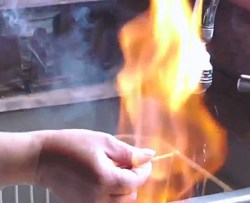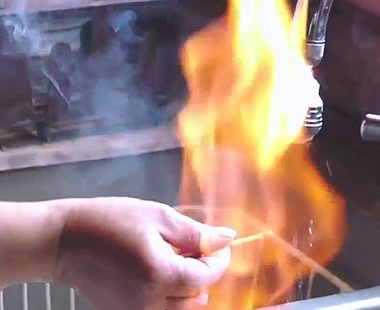Tests performed by the Pennsylvania Department of Environmental Protection found no copper, zinc, nickel, or titanium in water samples taken near a fracking wastewater site.
Well, actually, that’s not true. The Pennsylvania DEP didn’t report finding any of those metals, because the department’s oil and gas division didn’t ask for data on them. But the DEP found the metals. From the New York Times:

So remember: You have to ask if the water is flammable to get an answer.
Pennsylvania officials reported incomplete test results that omitted data on some toxic metals that were found in drinking water taken from a private well near a natural gas drilling site, according to legal documents released this week.
The documents were part of a lawsuit claiming that natural gas extraction through a method known as hydraulic fracturing, or fracking, and storage of the resulting wastewater at a site in southwestern Pennsylvania has contaminated drinking water and sickened seven plaintiffs who live nearby. …
Taru Upadhyay, the technical director of the department’s Bureau of Laboratories, said the metals found in the water sample but not reported to either the oil and gas division or to the homeowner who requested the tests, included copper, nickel, zinc and titanium, all of which may damage the health of people exposed to them, according to the federal Agency for Toxic Substances and Disease Registry.
Ms. Upadhyay said that the bureau did not arbitrarily decide to withhold those results. “It was not requested by our client for that particular test, so we did — it is not on our final report,” she said in a deposition on Sept. 26.
To be fair, the metals found in the water are not ones commonly used in the fracking process. The question raised by attorneys for the plaintiffs is less about the detected contamination than any uncovered bias.
Kendra Smith, a lawyer for Loren Kiskadden, whose water was tested by the Environmental Protection Department, contended that the department purposely avoided reporting the full results of its tests of Mr. Kiskadden’s water in June 2011 and January 2012, after using a method established by the federal Environmental Protection Agency known as 200.7. The method tests for 24 metals, only eight of which were reported, Ms. Smith said.
“Testimony of Ms. Taru Upadhyay was quite alarming,” Ms. Smith wrote Thursday in a letter to Michael Krancer, the state environmental secretary. “She revealed what can only be characterized as a deliberate procedure” by the oil and gas division and the Bureau of Laboratories “to withhold critical water testing results.”
At least one elected official is inclined to agree.
State Representative Jesse J. White, a Democrat who represents part of Washington County, accused the Environmental Protection Department of manipulating water tests to hide what he called “adverse results” from gas-drilling operations.
Earlier this year, the DEP fined Chesapeake Energy for allowing methane from a fracking well to contaminate a nearby water supply. Presumably, the DEP oil and gas division asks for tests on methane.



